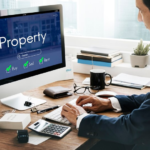Commercial property management is an evolving field that requires a combination of thinking, operational efficiency and financial expertise.
Within this guide, we will explore the essential elements and strategies required to optimize profitability in the realm of commercial property management.
Whether you are a seasoned professional or a newcomer to the industry, this guide is designed to offer valuable insights. For additional budget-friendly options, consider exploring Tradewind Investments.
Understanding the Basics
1. Defining Commercial Property Management
Before we explore profitability strategies it is crucial to grasp the aspects of property management. Commercial properties encompass a range of assets such as office buildings, retail spaces and industrial facilities.
As property managers our responsibility entails maintaining these properties on behalf of the owner while ensuring they are leased and generate revenue.
2. Roles and Responsibilities
The foundation of property management lies in understanding roles and responsibilities clearly. Lease administration, maintenance, financial reporting.
Each aspect is crucial in driving profitability for properties. Establishing a defined structure along with effective communication channels is pivotal, for efficient property management.
Strategies to Boost Profitability
3. Tenant Acquisition and Retention
- Effective Marketing Approaches
Attracting and keeping high quality tenants is crucial for property management. By implementing marketing approaches both offline you can significantly enhance the visibility and desirability of a commercial property.
Utilize platforms, create engaging property listings and leverage media to reach a wider audience.
- Building Strong Tenant Relationships
Establishing relationships with tenants not enhances tenant satisfaction but also contributes to long term profitability.
Promptly addressing concerns, maintaining lines of communication and adopting a customer approach are key factors in retaining tenants.
Satisfied tenants are more likely to renew leases resulting in reduced vacancy rates and improved property performance.
4. Optimizing Operational Efficiency
- Integration of Technology Solutions
In today’s era incorporating technology is vital for efficiency. Property management software can streamline tasks such as rent collection, maintenance tracking and financial reporting.
Automating these processes helps minimize errors, improves efficiency and enables property managers to focus on decision making.
- Proactive Maintenance Approaches
Implementing maintenance strategies is a way to preserve property value while minimizing unexpected expenses.
Regular property inspections, repairs and a proactive approach, towards addressing maintenance issues all contribute to tenant satisfaction. Enhance the overall appeal of the property.
5. Financial Budgeting
- Ensuring Accurate Financial Reporting
Precise reporting plays a crucial role in making well informed decisions. Property managers should implement accounting systems that meticulously track income, expenses and cash flow.
Regular financial reviews help identify patterns, evaluate the properties well being and make adjustments to optimize profitability.
- Strategic Budgeting for Success
Developing and adhering to a planned budget is vital for achieving profitability. It is essential to allocate resources, plan for market fluctuations and account for necessary capital improvements.
A prepared budget acts as a guiding map towards success enabling property managers to navigate challenges effectively and seize opportunities.
6. Enhancing Property Value
- Smart Renovations and Upgrades
Increasing the value of a property can be accomplished by enhancing its appeal. By undertaking renovations and upgrades that align with market trends and tenant preferences.
It becomes possible to attract higher quality tenants who are willing to pay premium rents. Additionally maintaining the properties modernity ensures influence on its valuation.
- Market Research and Positioning Strategies
Maintaining awareness of market trends and competition is crucial in property management practices.
Regularly conducting market research helps understand tenant preferences, rental rates well as identifying emerging opportunities within the market landscape.
Integrate AI-driven ChatGPT to understand real estate market trends, gather real-time data and make informed decisions.
Advanced Strategies for Maximizing Profitability
7. Diversification and Effective Portfolio Management
- Expanding Property Investments
To minimize risks and boost profitability property managers should consider diversifying their portfolios by acquiring properties in sectors or locations. A balanced portfolio can offer stability during fluctuating market conditions.
- Optimizing Lease Agreements for Greater Returns
Crafting lease agreements is crucial for maximizing revenue while minimizing risks. Property managers should carefully analyze lease terms, negotiate conditions and stay informed about rental rates in the market.
Regular lease reviews can uncover opportunities to adjust rents based on property performance and market trends.
8. Embracing Practices
- Environmental Sustainability for Long Term Benefits
Incorporating practices not only aligns with global initiatives but also enhances property value over time.
By implementing energy systems, adopting waste reduction measures and utilizing eco building materials property managers can attract environmentally conscious tenants while reducing operational costs.
- Social Responsibility for Positive Tenant Relations
Engaging in social responsibility initiatives can have an impact on a property’s reputation and tenant satisfaction levels.
Collaborating with communities supporting causes and actively contributing to the well being of the community are measures that tenants often appreciate from their property managers.
Conclusion
In summary, successfully managing properties requires an approach that covers various aspects such, as building strong relationships with tenants, ensuring efficient operations, effectively managing finances and making strategic decisions.
By following the strategies mentioned in this guide property managers can improve the performance of their properties, attract high quality tenants and ultimately maximize profits for property owners.
It is crucial to stay updated with market trends, adapt to changes and constantly look for opportunities to enhance performance in the evolving field of property management.
Additionally implementing techniques, like diversifying portfolios and adopting practices can further contribute to a strong and profitable property management strategy.



